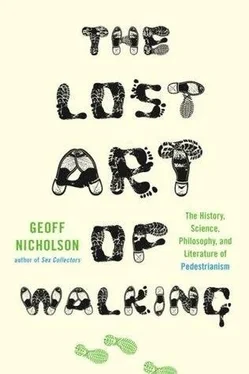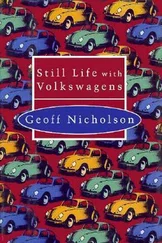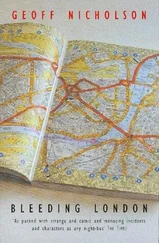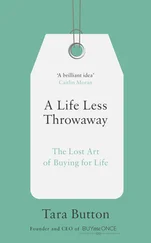Geoff Nicholson
The Lost Art of Walking
The Lost Art of Falling Down, When Bad Things Happen to Good Walkers, Some Fellow Travelers and Fellow Stumblers
Walking isn’t a lost art: one must, by some means, get to the garage.
— EVAN ESAR
‘Ajourney of a thousand miles begins with a single step’, or so Lao-tzu, the Chinese Taoist sage, is often quoted as saying. In fact, this is a free translation of what he actually said, which was more like, ‘The journey of a thousand miles begins beneath your feet’. My own feeling is that with most journeys, and especially the metaphoric sort, it’s extremely difficult to decide where and when that first step occurs. We’re already in motion before we know where we’re going, before we even realize that we’re on a journey at all. Designating a particular step as first or, for that matter, last is a tricky and often arbitrary business.
However, in my own case there was one particular step that was very different from any of the other steps I’ve ever taken in my life. It was a misstep, a stumble, a fall, a disagreement with gravity, a bone-breaking coming together of all-too-fragile body and all-too-solid earth.
Christmas was two days away, I was in Los Angeles, and I was feeling optimistic. I had decided to write a book about walking, my publisher had decided this was a fine idea, a commission was in the offing, and I was doing what could be construed as practical research. It was a warm, sunny California winter afternoon, and I was taking a long, hard walk in the Hollywood Hills.
That was where I lived at the time, and still do. It was, and is, one of my favorite places to walk in Los Angeles. It’s intriguing and glossily peculiar territory, the craggy high ground up above the flatland of the city, a place with ascents and descents that are steep enough to get your heart and lungs pumping, which is the whole point. From up there you get panoramic views over the sprawl, occasionally you can see all the way to the ocean, and you regularly catch sight of the Hollywood sign. There are palm trees, cactus, and bougainvillea, and sometimes you turn a corner and are suddenly confronted by a coyote or a deer crossing the street, as though they, and you, were still out in the wild.
Yet the Hollywood Hills, like much of L.A., are still essentially suburban: the hedges are trimmed, freshly cleaned cars stand gleaming outside double or triple garages. Residents are house-proud, and they keep themselves to themselves, and that’s one of the attractions. I was one of the few people who ever seemed to walk there. I encountered a few dog walkers, the odd person pushing a pram, the occasional jogger, a Mexican maid who didn’t have transport, but I seldom saw anyone who was simply walking for the hell of it, as I was. I never saw anyone fall down.
Of course, I take full responsibility for my own actions and my own accident, but there remains something inscrutable about it. I was perfectly clean and sober, for instance — and it would surely have hurt less had I been drunk. True, I wasn’t walking with any great care, but I wasn’t so self-absorbed as to be oblivious to where I was putting my feet. And although I was in good spirits, I don’t think there was any smugness or hubris in the equation. I certainly didn’t think that nothing bad could happen to me.
I was walking along briskly, happily, the street had a steep downward slope, but there was nothing treacherous about it, nothing I hadn’t successfully negotiated thousands of times before. There was even a sidewalk, by no means a given in many parts of L.A. But now, incomprehensibly, the negotiations broke down. I lost it. I tripped, I stumbled, I began to fall.
The older you get, the bigger a deal it is to fall down. When you’re age five you can hit the deck, skin your knees, bleed profusely, and be up playing again in five minutes. The older falling man is so much more vulnerable. He’s less supple, less resilient, less accustomed to the experience. He feels far more pain, embarrassment, and humiliation.
Even as I was falling I thought, Oh crap, I’m not really going to go all the way to the ground, am I? I’ll stop myself somehow. I’ll keep my footing. I’ll regain my balance. And then I knew I was wrong about that. I was going all the way. I’d passed the tipping point. Oh crap, indeed.
Then there was the impact, a much greater, more generalized blow than I’d been anticipating. I was on the ground, winded, hurting all over, feeling like a fool, trying to breathe deeply and regularly, and thinking, possibly saying aloud, ‘Oh man, this really, really hurts, this is a bad one’.
Even so, I didn’t imagine I was actually going to do anything other than get up, dust myself off, and carry on walking. I thought I might have ripped a hole in my jeans, but that was all the damage I was expecting. So I made all the moves you’d make in order to stand up, using my arms to push myself off the ground, and then I realized I couldn’t possibly do that: my right forearm was hurting far, far too much. And then I looked at the arm and saw that it appeared soft and spongy and was bent like a crescent roll. It was obviously, spectacularly broken. This was a brand-new experience. I hadn’t lived an especially careful life. I’d had my share of accidents and impacts, but I’d never broken anything before. It seemed both shocking and unlikely.
Naturally, I’ve since tried to work out exactly what happened, and in the absolute sense, I don’t know, and never will. But as far as I can tell, as I started to pitch forward, I reached out my right arm to break the fall. I had my camera in my left hand, and I was trying to protect it: a big mistake. All my weight and inertia homed in on my right wrist, with what now seems all-too-predictable results.
I lay on the ground unable to get up, and considered my options. If I’d had a cell phone with me I might have called 911 or, more likely, my wife, begging her to come pick me up, but I had no phone, just a camera, and I wondered if I could use the built-in flash as a distress signal. In the end it wasn’t necessary.
I wasn’t lying there very long before a guy getting into his car saw me on the ground, decided I wasn’t a derelict or junkie, and came to my assistance. He hoisted me up and drove me to a nearby fire station. This was the smart way of doing things, he assured me. The firemen would be able to give me some immediate first aid, then drive me to a hospital, where, having arrived in an emergency vehicle, I’d be able to jump the line in the emergency room. All this, in due course, proved to be true.
I was taken care of by a young fireman who had his surname stitched onto the pocket of his uniform: the name was Finger. He was grimly impressed by the look of my arm. ‘How’d ya do that?’ he asked. ‘Just walking’, I said. He shook his head. It didn’t seem right to him. It seemed downright weird. Normally, they only saw breaks like mine on people who’d fallen off ladders. He put me on a stretcher, put my arm in an inflatable splint, gave me enough morphine to disorientate me without quite killing the pain, and ferried me to a hospital, where everyone continued to respect the extremity of the injury.
The X-rays showed there wasn’t just one break but three: two in the radius, one in the ulna, with huge displacement all round. I’d have to have some serious surgery, was the opinion of the X-ray guys, and I’d end up with metal pins in my arm. They were right about all this. And they, too, were impressed. They thought my injury was something out of the ordinary, as though I must be one wild and crazy dude to have done that to myself by whatever method. They said it looked like a skateboard injury, and this made me feel just a little better. Another dose of morphine made me feel better still.
Читать дальше












